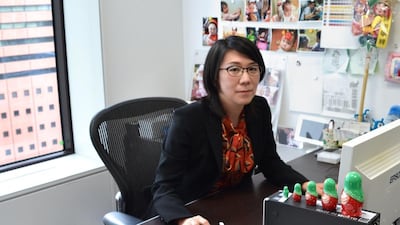Midori Katsumi, the managing director at PineBridge Investments, says they are bullish looking forward as Japanese companies are more than ever focused on profitability.
What is the asset class and geography you are focused on?
I manage Japan small-cap equity strategy for PineBridge Investments, a global multi-asset class investment manager.
What has been the effect of the Bank of Japan’s quantitative easing on the market?
Two significant events have taken place — the Bank of Japan announced its second quantitative easing programme, and the Government Pension Investment Fund (GPIF) said it would reduce exposure to domestic bonds while increasing allocations to domestic equities as well as international bonds and equities. From a Japanese stock picker’s point of view, the immediate effect of both these moves is caused by yen depreciation. A one yen to the dollar depreciation would lift full-year earnings by Japanese companies by about 0.7 per cent on average. Having said that, the yen has already been cheap in terms of the real effective exchange rate. The yen short position is mounting and the decline in oil price, if continued, would reduce Japan’s trade deficit and dollar purchases. So the recent rapid yen depreciation has increased the likelihood of short-term reversal of the yen and the Japanese equity market. However, any correction or reversal is unlikely to be severe over the next couple of years as long as valuations remain rational, as the GPIF could well act as a tactical buyer of equities and/or seller of the yen.
What is your outlook for the coming months?
The liquidity-driven rally would be fragile without any justification stemming from corporate fundamentals. Therefore, corporate earnings are key to the sustainability of the rally. We are bullish, because Japanese companies are more than ever focused on profitability. Earnings have in general been resilient despite weak domestic and global economic conditions, and growth should accelerate as the macro picture improves. The currency market has been the market driver up to now. Going forward, corporate governance and substantial profit growth are likely to lead the long-term bull market. As for my area of speciality, there are about 3,300 small-cap stocks in the Japanese market, compared to about 300 large caps, and the opportunity for a fund manager to generate alpha is significant given the abundant growth opportunities and inefficient pricing. We find many under-researched and undervalued hidden gems in our vast small-cap universe. So, when you look at the Japanese market, it’s definitely worth considering going into small caps to play Japan’s structural change story.
What are the main risks, either upside or downside, to the outlook?
Over the short term, the currency market is the main risk, particularly when speculative money is involved. Over the medium to long term, the speed of transformation at Japanese companies is key — whether companies can change quickly enough to meet expectations of investors. We believe change at some companies can quickly prompt others to follow. Jumping on a bandwagon tends to be a strong trait in Japan, rooted in an agricultural society where farmers traditionally sowed and harvested all at once because of fear that they may fall behind in the market.
What was the best investment you were ever involved in?
The best was an independent real estate manager that we bought in 2010. Most of its peers went out of business after the Lehman crisis. But this company succeeded in raising equity and strengthening its balance sheet. The risk of bankruptcy had significantly decreased when we bought, but the market valued the stock as if the company could still go bust. The share price then climbed five-fold in three years.
What was the worst?
We once owned shares in a software company and kept asking management about the company’s increasing inventory. The explanations we were given ended up being false, and the company had to disclose that there was accounting fraud. The experience reinforced our view that being on the ground, having excellent corporate access, asking the right questions and insisting on proper answers remain key to investing.
mkassem@thenational.ae
Follow The National's Business section on Twitter

